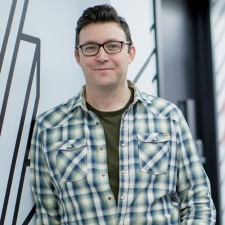The games industry plays host to an excellent cast of colourful and diverse individuals, from artists and coders to narrative designers and studio heads.
The skills to pull off these roles, however, are complex and differing. With each position requiring mastery in its field.
As such, seeing a game come together is a beautiful thing akin to a puzzle as an overall picture becomes whole.
To highlight some of the brilliant work that goes on behind the screen, and help others who may be keen to dive in, PocketGamer.biz has decided to reach out to the individuals who make up the games industry with our Jobs in Games series.
This time we caught up with Escape Studios head of games Simon Fenton, who designed the academy's undergraduate degrees and the MA in Game Art, to discuss his journey into games and what advice he has for others building a career in the industry.
PocketGamer.biz: Can you tell us about your current role and what it entails?
Simon Fenton: I joined Escape Studios in 2008, and I am now head of games. I’m responsible for the overall leadership, design and development of all games courses which include undergraduate, postgraduate and short courses.
My team and I work closely with our industry partners - Sony Computer Entertainment Europe, Rare, Mike Bithell Games and State of Play to design all of our courses.
This enables us to teach our students the most up to date skills with the latest software, so they’re prepared for a career in the industry as soon as they graduate.
It is a real privilege for me to teach and design courses that empower the next generation.Simon Fenton
Most recently, we’ve partnered with Rare for group projects and Framestore for our VR-focused modules, I’ve taken my industry experience and passion for games and created a Game Art course that helps students realise their goals and ambitions to enter the games industry as practising professionals.
Since launching our undergraduate degrees in 2016 we have seen a 100 per cent year on year increase in games students, which shows how much the industry is growing. I love this role, it affords me the chance to work with the best of the next generation – and it is a privilege to help them build the experience needed to start their careers in gaming.
How did you first get into games and how did you progress into this role?
I actually graduated with a Fine Art degree, but shortly after graduation I joined Bits Studios. After falling in love with the industry, I moved across to Sony Computer Entertainment Europe – where I stayed for 10 years designing and creating environments, characters and leading teams at a senior level.

I was lucky enough to work in senior leadership roles on nine published titles including Total NBA ’97, This is Football, The Getaway: Black Monday, Kinetic, Kinetic Combat and Sony PlayStation Home. But what really kicked off my love of teaching was the opportunity to create bespoke courses for corporate clients in the video games and TV sectors.
In this capacity, I worked with clients such as Rare, Big Big Studios and the BBC. I have also taught and organised co-training with Allegorithmic for Rare and organised Houdini training events for companies such as Sony, Microsoft, Rocksteady and Splash Damage.
Is it something you ever imagined yourself doing?
I have always been a passionate gamer and artist, so working in the games industry was an obvious choice – affording me the ability to take advantage of both of those passions.
I have always been a passionate gamer and artist, so working in the games industry was an obvious choice.Simon Fenton
Whilst teaching may not have been something that I always planned on getting into, I am very proud of Escape Studios’ ability to help students realise their goals and ambitions. It is a real privilege for me to teach and design courses that empower the next generation.
What did you study to get your role? What courses would you advise for aspiring professionals in the area?
I started my career as an artist in 1994 when I joined Bits Studios; I worked as a character and environment artist working on 3D cartoon games, creating characters, environments and animation for pre-rendered point and click titles.
I believe that aspiring professionals should get as much hands-on experience as possible. That’s why our 48-week MA in Game Art is made up of 18 weeks of studio‐based study time, a 12-week collaborative project and a 12-week final project – giving the students a unique and experiential view of what it means to work in a studio.
We also offer an alumni aftercare package that helps students polish their showreels to help them find the right job - with access to showreel clinics, studio access for 12 months and use of tons of resources on our VLE.
What part of your role do you find most fulfilling?
It is really satisfying to see the incredible work that our students create, both whilst they are at Escape Studios and as part of the wider industry.
One of my favourite examples of this sort of creativity is The Last of London, a second-year student group project. This was an innovative love letter to The Last of Us, where the students created an environment set in London as if it were a DLC map within the game’s universe.
After hearing about the incredible The Last of Us exhibition currently at the V&A, I was reminded of just how talented our students are to replicate such an incredible game.
Do you think there are any misconceptions, public or professional, surrounding your area of expertise?
I think there are a lot of misconceptions around the games industry and what it can offer young people. Primarily, I think there is confusion on the core skills needed, as well as the best ways to get into the industry.
Stay hungry and passionate, work hard and build your experience. You’ll get your chance.Simon Fenton
At Escape Studios, we believe that bringing the creative industries into the classroom at a much earlier age is key. It’s not just gaming that’s important, it’s also wider subjects such as art, which foster the creativity vital for a career in the world of games.
Within my own career, I specialised in fine art, and it's these skills combined with my passion for gaming that has fuelled my success. To produce future talent with creative flair, it’s important that we revisit our approach to learning and use the tools readily available to us to fuel education.
I think that there also may be a lack of knowledge around what games degrees can actually offer graduates. Instead of being confined to a career in games, we’ve seen graduates go on to work in all spheres of industry, from architecture to animation and VFX for film.
What other advice do you have for someone looking for a job in this profession?
The video games industry employs 50,000 in the UK and contributes £2.87bn to UK economy (BFI) – and it is only getting bigger. Stay hungry and passionate, work hard and build your experience. You’ll get your chance.





















